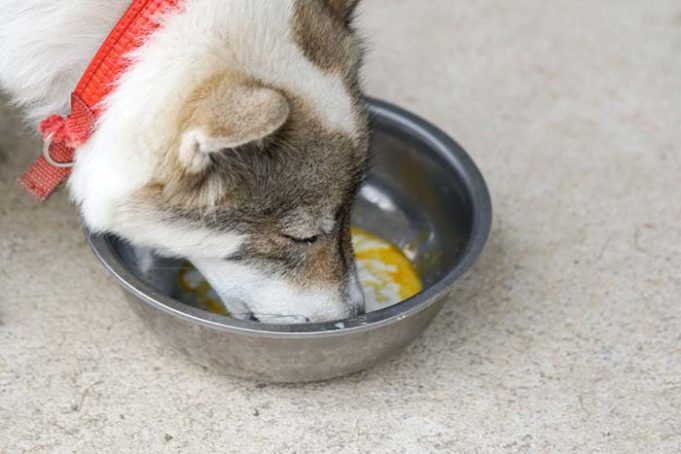First of all, can dogs eat raw eggs? After all, in the past, didn’t dogs used to steal eggs from birds’ nests and eat them raw, including the shells? But no, you shouldn't feed your dog raw eggs because there's a danger of contracting salmonella. Hard boiled eggs are much safer for dogs to consume and provide all the same nutrition.
Table of Contents
Cooked eggs are a good source of protein for dogs, particularly when included in homemade diets. They contain plenty of amino acids and are low in calories. Cooked eggs are excellent treats for dogs and have been known to help settle an upset stomach.
Your vet can tell you how many eggs your dog can have in a day or per week. Overfeeding eggs to a dog can cause problems, including biotin deficiency.
Some of the health benefits of eggs for dogs:
- Plenty of protein, which helps to build the dog’s body from the inside out.
- Vitamin B7 (biotin), which is found mainly in the egg yolks. This helps in the development of a healthy coat.
- Vitamin D, another vitamin that is found in abundance in eggs. It works together with the proteins in the egg to produce healthy teeth and bones.
Cooked eggs are excellent for a dog, as long as they are cooked plain with no salt, no butter, and no additives. Let’s look at some cooked egg varieties for your dog.
How to Cook Eggs for Dogs
Fried Eggs for Dogs
A fried egg won't cause your dog any serious harm, even though there are better ways to serve eggs to him. Fried eggs, of course, require butter or oil, and these unnecessary fats undermine the health benefits of the egg. It’s best to serve eggs cooked or boiled and plain.
Hard-boiled Eggs for Dogs
Boiled eggs are a good way to serve your dog. It is true that some of the nutrients can be diminished in the boiling process – it’s just the easiest way to provide your dog with an unsalted, plain egg.
Scrambled Eggs for Dogs
Scrambled eggs are fine for dogs – you just need to be careful of what you add to the eggs. Scrambled eggs need to be clean with no additives, no oils and nothing like garlic, salt, pepper, avocado, and other spices. Maybe a bit of cheese, but that is it.
Serve plain, simple, scrambled eggs to your dog. Start with small portions first to see if your dog’s stomach can handle it because some dogs’ stomachs are more sensitive than others – like humans. It’s OK for your dog to eat one scrambled egg daily, but they’re not recommended as a meal replacement.
Remember that onion and too much garlic will be toxic to dogs. And if you cook your scrambled eggs in butter or oil as you do for humans, then you run the risk of your dog swallowing way too much fat. This can result in health problems developing over time, such as diarrhea or pancreatitis.
What About Egg Shells?
You can feed your dog egg shells. In fact, the shell of the egg provide with the same nutrients the dog would get if he were eating bones from animal carcasses. Besides that, they are also an excellent source of calcium for dogs that are older and cannot chew on bones anymore.
You should always wash the shells of eggs before you feed them crushed up to your dog. Sometimes in the shops, the commercially sold eggs have had chemicals sprayed on them so that they look nice and shiny and healthy.
Boiling eggs (with shells) before serving helps to reduce the chance of getting Salmonella. After boiling, shells are best served crushed up and mixed in with his other food so as to avoid him choking.
Dog's Allergy to Eggs
Although most dogs can eat eggs, some of them could be allergic to this food item. Protein-rich foods like eggs, meat, dairy products, and soy products are common causes of allergies in dogs. If you notice your dog itching a lot, or he has digestive issues or even breathing problems, these could well be food allergies from the dog’s diet.
READ NEXT: Recipe for Sick Dog (with Eggs)














